Charles Dickens and 19th century England
- Fiche de cours
- Quiz et exercices
- Vidéos et podcasts
- Découvrir un aspect de la thématique d'étude art et contestation
- Approfondir ses connaissances sur la vie et l'œuvre de Charles Dickens
- Dickens est un auteur emblématique du
19me siècle anglais. Dans ses
écrits, il dénonçait les injustices
sociales croissantes à l'ère de
l'industrialisation :
- pauvreté,
- conditions et lieux de vie sordides
- l'exploitation des orphelins par les adultes censés les protéger (Oliver Twist)
- privation de nourriture dans les internats (Nicholas Nickleby)
- Il met en avant la distinction entre les classes sociales basée sur l'argent. Un argent qui sert aux riches à faire prévaloir leur supériorité sur les classes inférieures.
- Cet attachement à traiter des questions sociales s'explique par son expérience personnelle : son père fut emprisonné et lui-même forcé d'arrêter ses études pour travailler à l'usine, à seulement 12 ans.
When you think of English literature in the 19th century, you immediately think of Charles Dickens and his name is now associated with that period known as the Victorian era that he did not hesitate to attack in his writings. Indeed, Dickens was a social critic who used his imagination to denounce all kinds of abuses that fell upon his fellow citizens at a time when industrialization started to appear.
Preoccupied by the welfare of the people,
Charles Dickens’ social criticism appeared as
early as he wrote his first book,
Sketches by Boz (1836). These sketches,
or caricatures, of the English society allowed him to
depict what surrounded him: squalid slums, poverty,
prostitution...
Even though he will attack medicine, politics or
law in The Pickwick Papers (1837),
it is one of his most famous novels,
Oliver Twist, that will give him the
opportunity to tackle some institutions like
the Poor Law Amendment Act
of 1834 which he hated because it criminalised the
poor by claiming that the latter were idle and did not
want to work, preferring the help of the government: in
the workhouse the orphans are exploited by the
adults who are supposed to look after them. The novel
also depicts the poor living conditions of some of his
characters (thieves, murderers, prostitutes...) who have
to be very imaginative to make ends meet.
In Nicholas Nickleby, Dickens will describe
the terrible conditions of boarding schools where
schoolmasters abuse the children. There, pupils had to
starve and do chores instead of studying!
In Dombey and Son, Dickens is no longer
interested in individuals, he feels more concerned with
society itself, and more particularly the
industrialized society of the 19th century. In the
novel, Mr Dombey does not care about humanity, he is
proud and selfish because he has succeeded, and of course
his pride will lead him to his downfall. We can also
notice that one of Dickens’ preoccupations were
to emphasize the distinction between social
classes, the differences being based on money which
the upper class uses to show how superior they are.
Dickens’ other famous novels like
Bleak House, Great Expectations
or Hard Times all deal with social themes,
too. Degraded morality, corruption, lack of justice
for the poor can be found in the pages of these
novels.
But why was Charles Dickens so captivated by moral
and social issues?
When Dickens was a child, his father was arrested
and taken to the Marshalsea prison because
he could not pay his debts. This terrible episode
left an indelible stain in Dickens’ mind who
considered his father’s imprisonment as an
injustice.
He, whose dream was to become a gentleman, was
consequently forced to stop studying and was sent
working in a warehouse. He worked long hours
attaching labels on pots of blacking for six shillings a
week. We can assume that his interest in social matters
were born when he was 12 years old and never left
him, using his pen to disclose it.
Any novel by Charles Dickens deals with social or moral issues. They are worth reading, all the more as only he could find the words to strike a chord with his readers and give an accurate account of the situation in England in the 19th century. Oliver Twist, Pip, David Copperfield, Fagin or Estella will tell you more about that period than any social book.
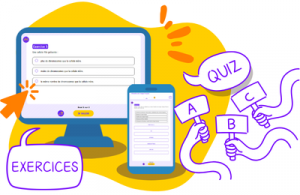
Des quiz et exercices pour mieux assimiler sa leçon
La plateforme de soutien scolaire en ligne myMaxicours propose des quiz et exercices en accompagnement de chaque fiche de cours. Les exercices permettent de vérifier si la leçon est bien comprise ou s’il reste encore des notions à revoir.
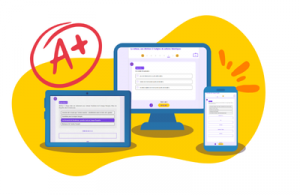
Des exercices variés pour ne pas s’ennuyer
Les exercices se déclinent sous toutes leurs formes sur myMaxicours ! Selon la matière et la classe étudiées, retrouvez des dictées, des mots à relier ou encore des phrases à compléter, mais aussi des textes à trous et bien d’autres formats !
Dans les classes de primaire, l’accent est mis sur des exercices illustrés très ludiques pour motiver les plus jeunes.

Des quiz pour une évaluation en direct
Les quiz et exercices permettent d’avoir un retour immédiat sur la bonne compréhension du cours. Une fois toutes les réponses communiquées, le résultat s’affiche à l’écran et permet à l’élève de se situer immédiatement.
myMaxicours offre des solutions efficaces de révision grâce aux fiches de cours et aux exercices associés. L’élève se rassure pour le prochain examen en testant ses connaissances au préalable.
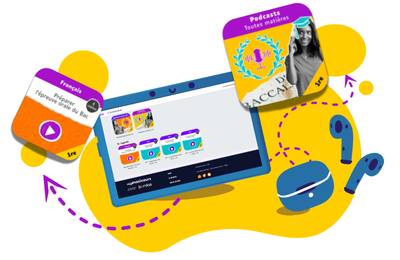
Des vidéos et des podcasts pour apprendre différemment
Certains élèves ont une mémoire visuelle quand d’autres ont plutôt une mémoire auditive. myMaxicours s’adapte à tous les enfants et adolescents pour leur proposer un apprentissage serein et efficace.
Découvrez de nombreuses vidéos et podcasts en complément des fiches de cours et des exercices pour une année scolaire au top !
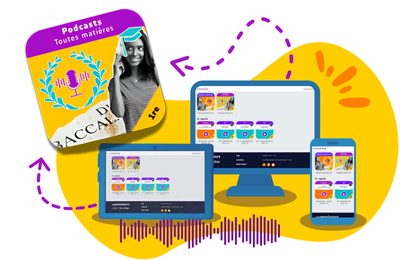
Des podcasts pour les révisions
La plateforme de soutien scolaire en ligne myMaxicours propose des podcasts de révision pour toutes les classes à examen : troisième, première et terminale.
Les ados peuvent écouter les différents cours afin de mieux les mémoriser en préparation de leurs examens. Des fiches de cours de différentes matières sont disponibles en podcasts ainsi qu’une préparation au grand oral avec de nombreux conseils pratiques.
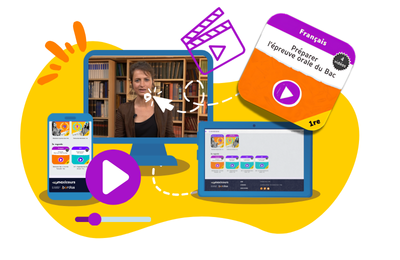
Des vidéos de cours pour comprendre en image
Des vidéos de cours illustrent les notions principales à retenir et complètent les fiches de cours. De quoi réviser sa prochaine évaluation ou son prochain examen en toute confiance !








